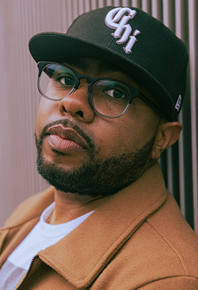It’s Important I Remember That the Only Thing We Have to Fear Is Fear Itself—
by Cortney Lamar Charleston
for it immobilizes far less frequently than it thrusts us forward.
Fear funds the police department and the FBI.
Fear designed the suburb and the housing project in opposition.
Fear is building the wall right now how it built the schoolhouse,
how it built the prison and made those two synonyms by sight.
When you look into my eyes you see fear
because you are afraid of me:
fear is your reflection, reveals you to you
by way of my form, and always you turn away, turn away, turn away.
I’m not afraid: I’m full of your fear.
It spills out of me like water but is indeed a thing thicker than that—
onto the floor, into the street.
Thoroughly sinister or evil.
Indicative of condemnation or discredit.
Characterized by hostility or angry discontent.
So reads black by Noah Webster’s hand, who is no poet.
Only you could write us into these words— your fear
spills from books like ink; from newspapers and magazines, like ink;
from penal codes, like ink—embraces permanence, permeates,
portends the dispatch from the nearest precinct into my ordinary life
on an ordinary night, the road sorrowed slick by sideways rain.
When that particular President Roosevelt addressed fear,
my people were not his primary concern;
tens of millions of white folk had been reduced to a diet of dust,
as many always have been, and as many, I worry, always will be.
It’s been the same deal with them since forever. They’ll be fed
hope or they’ll be fed lies, and I can always tell what they’ve ingested:
every time we encounter at the eyes, if I see the flame flicker, faintly;
if darkness floods the smallness of the space they are, it will spill over.
Whether the man that is a mirror is shattered in that moment, who knows—
but one can pray not because one can still fear God.
If there is one emotion that has dominated the past decade of living in the United States of America, it is fear. Fear is animalistic, a foundational component of our experience as living beings, and it is this truth that makes fear the most important and powerful political lever there is, even above hope. The issue is, however, that the fear we experience as biological entities is typically urgent and situational; it is momentary; it is what sends us into fight or flight mode. Fear as political tool is deliberate; it is patient; and it is excuse. Fear, politically, permits our most horrible designs on other people under the guise of self-preservation, pretending it something more rational than cruel or inarguably evil.
The irony that I’ve had to sit with these past several years, if not my entire life, is that fear as recognized and acknowledged in society, is a predicament only the powerful face; fear is something only those with something to lose are allowed to experience and receive sympathy for. What marginalized communities experience in response to that same pervasive and privileged sense of fear—such as, say, Black drivers pulled over by police in a routine traffic stop—is biological, emotional, and devastatingly real; it is not, however, socially significant. That fear, if it is even widely acknowledged, does not receive intervention aimed at resolution or prevention.
In writing this poem, which I penned during an ascent of fascism in America, I was interested with delineating between but also intertwining the biological and sociological constructions of fear as a commentary on how power is wielded through it. The poem may rely on some historical allusions to aid it along its journey, and it certainly is grounded in the educational experience of Black people in America (which is the perspective I feel most astute and appropriate writing from), but it has its eyes focused firmly on this moment in American history for all peoples party to We, the People. This poem is a worry manifested that what has been before will continue to be; these are words bristling under the anxiety that a working design will be scaled and, along with it, many magnitudes of people sacrificed due to our unwitting participation.
 Cortney Lamar Charleston is the author of Telepathologies and Doppelgangbanger. He was awarded a 2017 Ruth Lilly and Dorothy Sargent Rosenberg Fellowship from the Poetry Foundation, and he has also received fellowships from Cave Canem and the New Jersey State Council on the Arts. Winner of a Pushcart Prize, his poems have appeared in POETRY, The Nation, The Atlantic, The American Poetry Review, Granta, and elsewhere. Charleston serves as a poetry editor at The Rumpus and on the editorial board at Alice James Books.
Cortney Lamar Charleston is the author of Telepathologies and Doppelgangbanger. He was awarded a 2017 Ruth Lilly and Dorothy Sargent Rosenberg Fellowship from the Poetry Foundation, and he has also received fellowships from Cave Canem and the New Jersey State Council on the Arts. Winner of a Pushcart Prize, his poems have appeared in POETRY, The Nation, The Atlantic, The American Poetry Review, Granta, and elsewhere. Charleston serves as a poetry editor at The Rumpus and on the editorial board at Alice James Books.